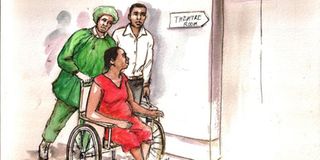Death following wrong blood transfusion - part II

What you need to know:
The genesis: A mother died after a blood transfusion. It was later discovered she had been given blood of a group that was not compatible with hers. Her family sued seeking answers and justice.
An insurance firm that also doubled as a health service provider was sued when a mother under their care died after receiving a wrong blood transfusion. The parent company is registered in a neighbouring country but in Uganda it is a duly incorporated limited liability company engaged in provision of private health services and health insurance.
The deceased had attended their antenatal clinic and had been issued with a card. On the card her blood group had been stated as B+ and on the basis of this, the mother was given a wrong blood transfusion. The case against the insurance company was therefore of negligent classification of the deceased’s blood group.
The insurance firm, however, raised a number of objections such as the Ugandan court did not have jurisdiction to hear this case as the parent company was registered in a neighbouring country and that the agreement in the contract was to the effect that any issues of contention were to be referred for arbitration, which had not been done in this particular case. A particular clause in the contract was that “all differences arising out of this policy shall be referred to the decision of an arbitrator.”
And more so such claims were subject to a limitation period. Court, however, noted that despite these pleadings, the insurance firm did not apply formally to court to have this matter referred for arbitration.
Lawyers for the family of the deceased, however, countered these arguments by telling court that cases for arbitration were those specific to issues of insurance but not civil wrongs (torts).
The insurance firm offered health services to the deceased independently of the contract and that the suit brought against it was in respect of a breach of duty to care.
Court rejected the arguments advanced by the insurance firm on grounds that the company had subjected itself to the jurisdiction of the court, participated fully in the trial, cross examined witnesses, led evidence of its witnesses and filed submissions, including the objections at this late stage of the case.
Further, the company did not invoke the in-built trigger mechanisms for arbitration as set out in the contract. Court did not, therefore find merit in the objections as the matter before it was not related to the insurance policy to which the contract referred.
Court was further satisfied that the insurance firm had been correctly sued as it was a fact that a client the company had chosen to offer health care had died and the death was due to a wrongful act and that the company could be responsible.
It was not in contention that the company offered antenatal services to the deceased as evidenced by the alleged insurance of an antenatal card and a claim that persons working for the insurance firm wrongly classified the blood group of the deceased.
The issue that court resolved was whether the insurance firm was negligent in classifying the blood group of the deceased. The evidence before court was the antenatal card of the deceased indicating that she was blood group B+.
The husband of the deceased testified before court that he informed the doctor that his wife was blood group O+ and not B+ as she was being wheeled to the theatre. To the husband, the doctor instead relied on the records of the insurance company to transfuse his wife with the wrong blood group. The husband also told court that he only saw the antenatal card with the wrong blood group on the day his wife was taken to the theatre.
The attending doctor, however, told court that she sent the patient for various blood tests at different times but these, apparently were not done as the results were not reflected on the antenatal card.
There was no signature or date on the antenatal card of the deceased against the blood group B+ and neither did the card have any official stamp.
The card did not bear any registration number. The attending doctor further told court she did not know who filled out the blood group.
To be continued




